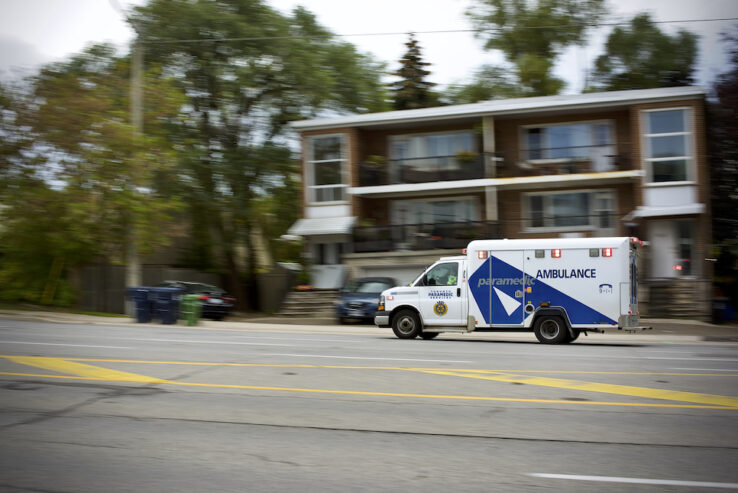
By Alisa Kim
As a paramedic, Amir Allana responds to a wide range of calls—from a heart attack or stroke to people struggling with mental health issues and addiction.
“On a given day, I might go from acute trauma to someone who’s 70 who has just had a fall but is otherwise uninjured. The next call might be for someone who’s in a shelter system who has a number of chronic conditions that have gotten worse or who just needs somewhere to go. You’re trying to navigate—to what extent is this a health issue versus a social issue? Is this an addictions issue? You’re switching gears all the time, and a lot of it is case-finding, triage and navigation of the health system,” says Allana who defended his master’s thesis in IHPME’s Health Systems Research program in January 2022.
He notes traditional medical emergencies account for a small fraction of the cases he sees. “It’s difficult for newer paramedics who spend all their schooling thinking about trauma and cardiac arrest, only to realize, ‘Oh, that’s just 10% of what I do.’ Not enough education or cultural pieces are in place to tell them, ‘Actually, your role for the most part is diagnostics and care navigation. Your role is an extension of health services because you’re mobile in the community,’” he says.

He and his co-supervisor, Dr. Andrew Pinto, published a paper in Healthcare Policy that explores how paramedics can address social determinants of health more effectively. Care could be improved, they argue, by equipping paramedics with tools for better social and environmental assessments. An example would be questionnaires to help paramedics assess patients for risks associated with housing, income and food insecurity. Paramedics could also address social factors linked to health by working directly with community-based organizations like legal aid, shelters, detox centres, food banks and employment agencies. Doing this requires shifts in paramedic education, culture and governance, says Allana.
His research also looks at integrated care and how paramedics can extend primary and preventive care in home and community settings. Allana says the pandemic has exposed the vulnerability of the health system and provides an opportunity to think about how to restructure it in a way that leverages local agencies and services to improve outcomes. “There are approaches to care that can be provided in the community, but require a rethink of the role of primary care, community-based nursing and mobile care teams—including paramedics and mental health services—to address people’s needs in a way that doesn’t rely just on doctors and nurses in a hospital,” he says.
In a study published in the International Journal of Integrated Care, Allana looked at 108 programs around the world that use paramedics in various care pathways in the community. He found paramedics bridged gaps in care by working across silos between hospitals, social services, primary care and public health. For instance, in some places, paramedics work with primary care teams to address flare-ups of chronic diseases like heart failure (when the heart is too weak to meet the body’s pumping needs) and chronic obstructive pulmonary disorder (a lung disease that causes breathing problems). Here, primary care teams send paramedics into the community to address needs both reactively and proactively.
“Even something simple like weight monitoring for people with congestive heart failure can catch deterioration early,” says Allana. “Systems can be put in place by family health teams and paramedics to follow care plans and adjust medications. There’s something in the middle of purely scheduled primary care and highly acute unscheduled emergency care—there’s a big gap in the middle that no one fills, and a lot of new [paramedicine] programs are filling that.”
A more expansive view of the profession is needed and investing in the capacity of paramedics to provide urgent and preventive care will strengthen the health system, Allana says. “The use of emergency departments and hospital services has outstripped population growth for several decades and that’s going to continue to happen. The reason for that is you’re not providing appropriate care options in the community. We don’t have capacity in the acute care system to appropriately care for people. If you invest in prevention and care coordination, it’ll pay off in the long term and curb the need for additional emergency coverage over time.”
Related News

Sign up for IHPME Connect.
Keep up to date with IHPME’s News & Research, Events & Program, Recognition, e-newsletter.
Subscribe to Connect Newsletter
Get in Contact
Communications
Marielle Boutin
Email Address: ihpme.communications@utoronto.ca





